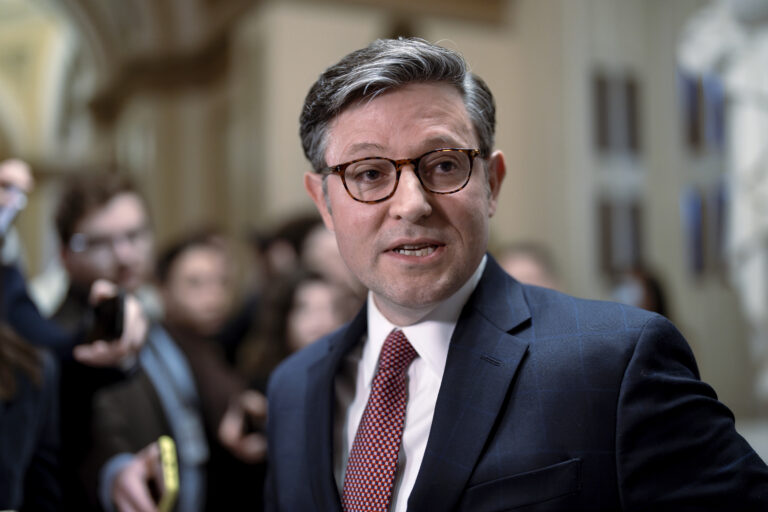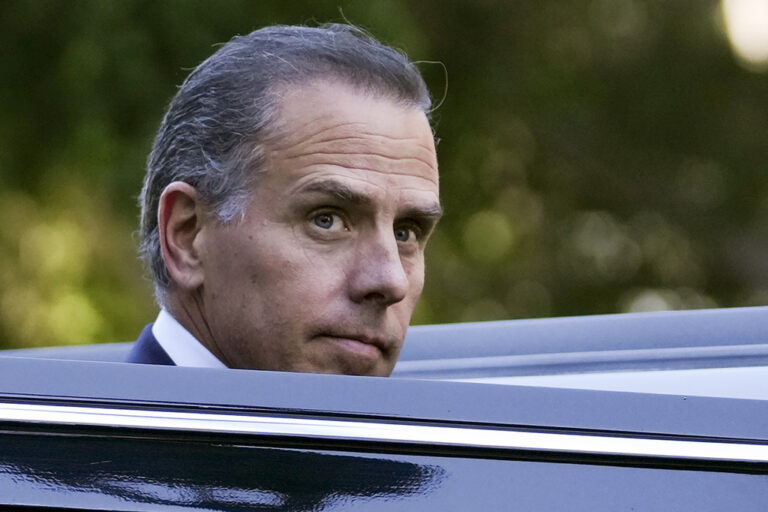President Joe Biden on Friday pressed Congress to embrace a bipartisan Senate deal to pair border enforcement measures with Ukraine aid, but House Speaker Mike Johnson suggested the compromise on border and immigration policy could be “dead on arrival” in his chamber.
The Democratic president said in a statement late Friday that the policies proposed would “be the toughest and fairest set of reforms to secure the border we’ve ever had in our country.” He also pledged to use a new emergency authority to “shut down the border” as soon as he could sign it into law.
Biden’s embrace of the deal — and Republican resistance — could become an election-year shift on the politics of immigration. Yet the diminishing prospects for its passage in Congress may have far-reaching consequences for U.S. allies around the globe, especially Ukraine.
Senate Republicans had initially insisted that border policy changes be included in Biden’s $110 billion emergency request for funding for Ukraine, Israel, immigration enforcement and other national security needs. But the Senate deal faced collapse this week as it came under fire from Republicans, including Donald Trump, the likely presidential nominee, who eviscerated the deal as a political “gift” to Democrats.
Johnson, a Louisiana Republican, on Friday sent a letter to colleagues that aligns him with hardline conservatives determined to sink the compromise. The speaker said the legislation would have been “dead on arrival in the House” if leaked reports about it were true.
A core group of senators negotiating the deal were hoping to release text early next week, but conservatives already say the measures do not go far enough to limit immigration. The proposal would enact tougher standards on migrants seeking asylum as well as deny asylum applications at the border if daily migrant encounters grow to numbers that are unmanageable for authorities.
“Rather than accept accountability, President Biden is now trying to blame Congress for what HE himself intentionally created,” Johnson said in the letter.
The speaker’s message added to the headwinds facing the Senate deal, closing a week in which Senate Republican Leader Mitch McConnell acknowledged to his colleagues that the legislation faced tough opposition from Trump that could force them to pursue Ukraine aid another way. He later clarified that he was still supportive of pairing border measures with Ukraine aid.
If the deal collapses, it could leave congressional leaders with no clear path to approving tens of billions of dollars for Ukraine. Biden has made it a top priority to bolster Kyiv’s defense against Russia, but his administration has run out of money to send ammunition and missiles. Ukraine supporters warn that the impasse in Congress is already being felt on battlefields and leaving Ukrainian soldiers outgunned.
Oklahoma Sen. James Lankford, the lead GOP negotiator in the border talks, has repeatedly urged lawmakers to refrain from passing final judgment on the bill until they receive legislative text and said some of the reports of its contents in conservative media are not accurate depictions of the bill.
The Republican speaker was already deeply skeptical of any bipartisan compromise on border policy. On Friday, he again pointed to a sweeping set of immigration measures that the House passed last year as being the answer to the nation’s border challenges. But that bill failed to gain a single Democratic vote then and has virtually no chance of picking up Democratic support now, which would be necessary to clear the Senate.
As they enter an election year, Republicans are seeking to drive home the fact that historic numbers of migrants have come to the U.S. during Biden’s presidency. His administration has countered that global unrest is driving the migration and has sought to implement humane policies on border enforcement.
“Securing the border through these negotiations is a win for America,” Biden said in the statement. “For everyone who is demanding tougher border control, this is the way to do it.”
Still, the speaker leaned into the Republican push on immigration, saying in his letter that the House would hold a vote on impeaching Homeland Security Secretary Alejandro Mayorkas “as soon as possible” after a committee advances articles of impeachment against him next week. Johnson also said he was standing with Texas Gov. Greg Abbott, who has refused to give federal Border Patrol agents access to a riverfront park that is a popular corridor for migrants illegally entering the U.S.
But Johnson is also under potential pressure himself.
If the Senate were to pass an immigration and Ukraine package, he would face a decision about whether to bring the measure to the floor. And while the speaker is skeptical of continued funding for Ukraine, he has also expressed support for halting Russian President Vladimir Putin’s advance in Europe.
At the same time, hardline House conservatives have become vocal opponents of any compromise on immigration policy. Rep. Marjorie Taylor Greene, a hard-right Republican of Georgia, has threatened to initiate an effort to oust Johnson if he put the Senate deal on the House floor.
“This bill represents Senate Republican leadership waging war on House Republican leadership,” said Sen. Ted Cruz, a Republican of Texas, at a news conference this week.
Still, other Republicans have lamented that conservatives are throwing away an opportunity to gain a victory on an issue they have talked about far more than Democrats.
Opposition from the right has stymied efforts to reform immigration law in Congress for decades. Trump allies have argued that Congress does not need to act because presidents already have enough authority to implement tough border measures.
Johnson echoed that sentiment in his letter, arguing that Biden could start to fix the border problems “with the stroke of a pen.”
Sen. Markwayne Mullin, an Oklahoma Republican, said earlier this month that conservative reports on the bill had “ginned up a lot of the base” voters against the proposals, even as the policy represented meaningful changes to immigration enforcement.
“This is a national security issue,” Mullin said. “And if you’re waiting until another president gets in, you’re playing politics with it.”
(AP)











